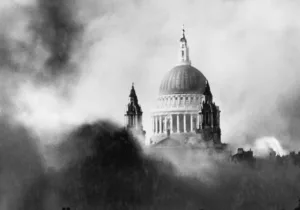A bust of Winston Churchill, on loan from the British government, has returned to the Oval Office after having been controversially returned to the British, ostensibly by the Obama administration, which had a second, permanent Churchill bust on hand that was gifted to LBJ. Last week Prime Minister Theresa May posed with the re-loaned bust next to the new President.
It’s important to recall Churchill as more than an inspirational statue. He was a passionate advocate of an international order led by the Anglo-American democracies. The phrase “America First” would not please Churchill, who was the chief target of the America First isolationist movement that zealously opposed U.S. aid for Britain before America entered WWII.
Churchill pleaded for U.S. entrance into WWII, subordinating Britain to its new senior partner, and imagining, of a sorts, that America would be the new Rome, with Britain as superseded classical Greece, whispering wisdom into the ears of the hyperpower. But Churchill did not see this alliance of senior and junior partners, and including the wider Anglosphere of Canada, Australia and New Zealand, as hegemonic but fraternal and benevolent, for the benefit of the whole world’s liberty, peace and prosperity.
This union of the English-speaking peoples, as Churchill saw it, was a global community woven together across more than a millennium of shared history. Their common legacy included Common Law, Magna Carta, parliamentary triumph over royal absolutism, and a sacred regard for liberty including free speech, religious freedom and protections of property and against arbitrary state power. It also encompassed free trade over open sea lanes, the mass movements of peoples, vigorous commerce and industry, populations enriched by immigration, and persistent but not naive good will that sought collaboration with other nations.
The Anglosphere as Churchill conceived was Anglo-Saxon in its heritage, but its self-identity was not racial or ethnic. Its lands in Britain, North America and Oceania were always refuges for entrepreneurs and religious pilgrims, from French Huguenots to Russian Jews to Chinese merchants. Anglosphere populations are always churning demographically but upheld by an innate, democratic civil order resistant to dictators, pogroms and wide scale political violence. These peoples, as Churchill celebrated, politely stand in queues and respect the results of peaceful ballots, overseen by a free press.
For Churchill, the Anglosphere was not just a community of nations with shared history and attitudes but a spiritual body, shaped by independent English piety, the King James Bible, a literate, often restless and even rebellious Protestantism jealous of liberty and suspicious of centralized power, whether in its own land, or massing abroad. This spirit defied continental tyrants and conquerors, the most sinister of which Churchill himself would resist.
Churchill believed in and sought a global harmony to the extent possible. The Anglo-American alliance was paramount, but he urged after WWII a restoration of fallen France, the creation of a democratic and revived Germany, both elevated to “spiritual” greatness, a European fraternity that respected sovereignty, NATO, the Commonwealth, and negotiated collaboration with the Russians. The concert rested ultimately on American power, supported by the British, guided by wisdom and justice.
But material power was not sufficient, Churchill warned. The English-speaking people must adhere to their ancient dedication to liberty for all, as he declared in his 1946 Iron Curtain speech:
It is not our duty at this time when difficulties are so numerous to interfere forcibly in the internal affairs of countries which we have not conquered in war. But we must never cease to proclaim in fearless tones the great principles of freedom and the rights of man which are the joint inheritance of the English-speaking world and which through Magna Carta, the Bill of Rights, the Habeas Corpus, trial by jury, and the English common law find their most famous expression in the American Declaration of Independence.
All this means that the people of any country have the right, and should have the power by constitutional action, by free unfettered elections, with secret ballot, to choose or change the character or form of government under which they dwell; that freedom of speech and thought should reign; that courts of justice, independent of the executive, unbiased by any party, should administer laws which have received the broad assent of large majorities or are consecrated by time and custom. Here are the title deeds of freedom which should lie in every cottage home. Here is the message of the British and American peoples to mankind. Let us preach what we practise – let us practise what we preach.
Amen. Churchill’s bust is an important and welcome presence. Fidelity to the freedoms he championed is even more imperative.






